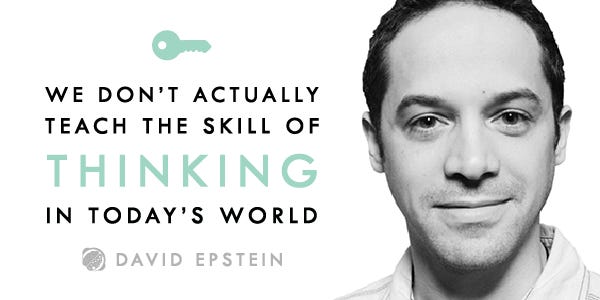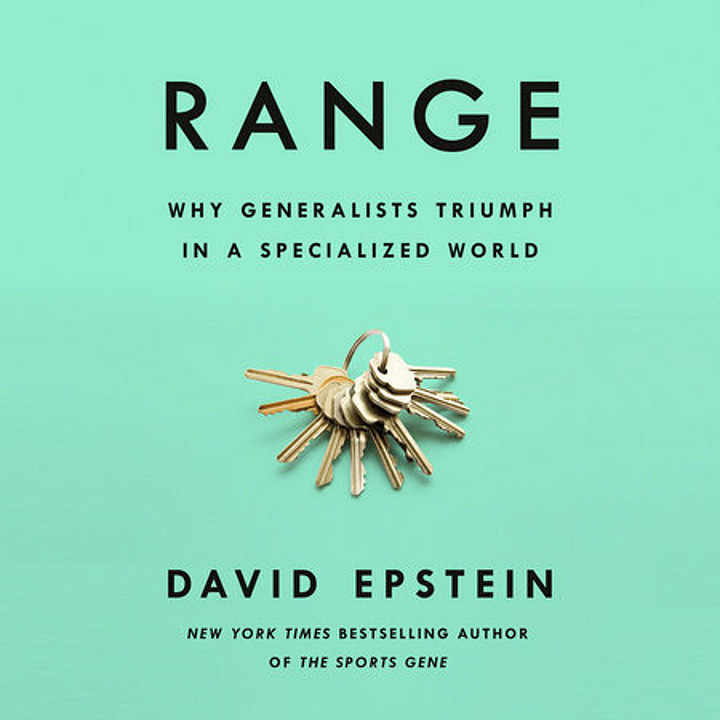

David Epstein's "Range: Why Generalists Triumph in a Specialised World," published in 2019, presents a compelling and counterintuitive argument against the pervasive push for early specialisation in a rapidly evolving world. Epstein, a former science and sports journalist, meticulously weaves together a tapestry of research, anecdotes, and compelling stories to champion the power of breadth, diverse experiences, and the often-underestimated strength of the generalist.
Reading "Range" felt like a validation of my winding career path, which involved detours through seemingly unrelated fields before landing in my current role. Epstein's exploration of the "myth of the head start" resonated deeply, reminding me of times I felt behind my more specialised peers, only to later realise how my diverse experiences offered unique problem-solving abilities. The concept of "sampling" affirmed my belief in encouraging my mentees to explore various interests without the pressure of early commitment, a stark contrast to the often-singular focus promoted in our educational system. Ultimately, "Range" provided a comforting and empowering perspective, suggesting that the breadth of our experiences, even those that seem tangential, can be our greatest strength in navigating an increasingly complex world.
About the Author
David Epstein is an accomplished author and journalist known for his insightful explorations of human performance and the science of expertise. Before "Range," he penned the acclaimed "The Sports Gene: Inside the Science of Extraordinary Athletic Performance," which delved into the complex interplay of genetics and training in athletic success. His background in science and storytelling allows him to present complex ideas in an engaging and accessible manner, making "Range" a thought-provoking read for a wide audience.
Key Takeaways
"Range" challenges the widely held belief that early specialisation and relentless deliberate practice are the sole paths to mastery and success. Instead, Epstein argues that in many fields, particularly those characterised by complexity and unpredictability (which he terms "wicked" domains), a broader range of experiences and skills provides a significant advantage. Here are some key takeaways:
The Myth of the Head Start
The book debunks that an early start and intense focus on a single area are always beneficial. While it may work in "kind" domains with clear rules and immediate feedback (like chess or golf), it can be detrimental in more ambiguous fields. Epstein highlights examples like Roger Federer, who dabbled in various sports before focusing on tennis, ultimately achieving greater success than many early specialists.
The Power of Sampling
Exploring different interests and activities early in life allows individuals to discover their true passions and develop a wider array of skills and perspectives. This "sampling period" leads to better "match quality" – finding the right fit for one's abilities and interests in the long run, often resulting in greater fulfilment and success.
Breadth Fuels Creativity and Innovation
Generalists, with their diverse knowledge base, are better equipped to make connections across different domains, fostering creativity and innovative problem-solving. They can draw upon a wider toolkit of mental models and approaches, leading to more novel and effective solutions in complex situations.
The Importance of "Slow Learning"
Epstein advocates for learning that is sometimes inefficient and challenging in the short term but leads to deeper understanding and long-term retention. This contrasts with the immediate gains seen in highly focused, repetitive practice, which may not translate well to novel situations.
Rethinking Grit
The book challenges the simplistic view of grit as unwavering persistence in a single direction. Instead, it suggests that "match quality" influences perceived grit. When individuals find a field that genuinely resonates with them, their perseverance appears more natural and sustainable. Knowing when to quit a path that isn't a good fit can be a strength, not a weakness.
The Value of Outsider Perspectives
Experts can sometimes become entrenched in their narrow focus, missing broader trends or alternative solutions. Generalists, with their outsider perspectives and ability to draw from different fields, can often bring fresh insights and challenge conventional wisdom.
Leadership Lessons
"Range" offers valuable lessons for leaders across various fields:
Cultivate Diverse Teams: Leaders should recognise the strength in assembling teams with diverse backgrounds, experiences, and areas of expertise. This fosters a richer environment for innovation and problem-solving, as different perspectives can lead to more comprehensive and creative solutions.
Encourage Exploration and Learning: Organisations should create a culture that encourages employees to explore different roles, develop a broader skillset, and engage in continuous learning across disciplines. This can lead to a more adaptable and resilient workforce.
Value Different Paths to Expertise: Leaders should recognise that expertise doesn't always follow a linear path of early specialisation. Individuals who have taken circuitous routes and gained diverse experiences can bring unique value and insights to the table.
Promote Cross-Functional Collaboration: Breaking down silos and encouraging collaboration between teams with different specializations can unlock synergies and lead to more holistic and innovative outcomes.
Recognise the Limitations of Over-Specialisation: Leaders should be aware of the potential for "tunnel vision" in highly specialised roles and actively seek out broader perspectives to avoid blind spots and foster more adaptable strategies.
Implementation in Everyday Life
The principles espoused in "Range" can be practically applied in our daily lives:
Embrace Curiosity and Exploration: Don't be afraid to dabble in different hobbies, subjects, or activities, even if they seem unrelated to your primary interests. These experiences can broaden your perspective and unlock hidden talents.
Prioritise Learning Over Immediate Efficiency: When learning something new, focus on understanding the underlying principles rather than just trying to achieve quick results. Embrace the struggle and allow for a more in-depth and lasting understanding.
Connect Ideas Across Domains: Actively look for connections between different areas of knowledge or experience. This can enhance your creativity and problem-solving abilities in both personal and professional contexts.
Be Open to Change and Pivoting: Recognise that your initial path may not be the optimal one. Be willing to reassess your goals and make changes if you discover a better fit for your interests and abilities.
Value Diverse Perspectives in Discussions: When faced with challenges or decisions, seek out the opinions of people with different backgrounds and experiences. Their varied viewpoints can offer valuable insights you might otherwise miss.
Encourage a "Sampling Period" for Children: As parents and educators, we should encourage children to explore a variety of interests and activities before pushing them towards early specialisation. This allows them to discover their passions and develop a broader foundation of skills.
Conclusion
"Range" is a thought-provoking and timely book that challenges conventional wisdom about the path to success. By highlighting the power of breadth, diverse experiences, and the often-overlooked strengths of generalists, David Epstein offers a refreshing perspective in an increasingly specialised world. This book is a valuable read for anyone seeking to understand the complexities of human development, leadership, and the ever-evolving landscape of personal and professional achievement. It encourages us to embrace our multifaceted nature, value exploration, and recognise that sometimes, taking the scenic route can lead to the most fulfilling and impactful destinations.




